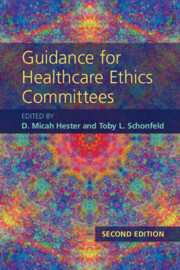Book contents
- Guidance for Healthcare Ethics Committees
- Guidance for Healthcare Ethics Committees
- Copyright page
- Dedication
- Contents
- Contributors
- Preface
- Section 1 The Context of Healthcare Ethics Committee Work
- Chapter 1 Introduction
- Chapter 2 Brief Introduction to Ethics and Ethical Theory
- Chapter 3 Healthcare Ethics Committees and the Law
- Chapter 4 Understanding and Addressing Health Disparities through a Racial Paradigm
- Chapter 5 Cultural and Religious Issues in Health Care
- Chapter 6 Moral Distress
- Section 2 Consultation
- Section 3 Policy Development and Organizational Issues
- Index
- References
Chapter 3 - Healthcare Ethics Committees and the Law
from Section 1 - The Context of Healthcare Ethics Committee Work
Published online by Cambridge University Press: 17 February 2022
- Guidance for Healthcare Ethics Committees
- Guidance for Healthcare Ethics Committees
- Copyright page
- Dedication
- Contents
- Contributors
- Preface
- Section 1 The Context of Healthcare Ethics Committee Work
- Chapter 1 Introduction
- Chapter 2 Brief Introduction to Ethics and Ethical Theory
- Chapter 3 Healthcare Ethics Committees and the Law
- Chapter 4 Understanding and Addressing Health Disparities through a Racial Paradigm
- Chapter 5 Cultural and Religious Issues in Health Care
- Chapter 6 Moral Distress
- Section 2 Consultation
- Section 3 Policy Development and Organizational Issues
- Index
- References
Summary
Every ethics committee member needs to know something about the laws that shape and govern the clinical encounter. This is not because the law will typically determine the answers to the questions faced by the committee – far from it! Most of the problems faced by HECs aren’t answered by any statute, regulation, or judicial holding. But that doesn’t mean that law is irrelevant to the work of ethics committees. In some cases, law may define the terms in which a particular problem is discussed: “She needs to get his informed consent.” In others, law may rule some possibilities out: “We can’t just turn her out into the street.” In still others, law may authorize or even require the committee’s deliberation: “We can’t avoid making this decision.” In sum, law works mostly not to solve ethics committees’ problems, but to shape them.
- Type
- Chapter
- Information
- Guidance for Healthcare Ethics Committees , pp. 20 - 29Publisher: Cambridge University PressPrint publication year: 2022



